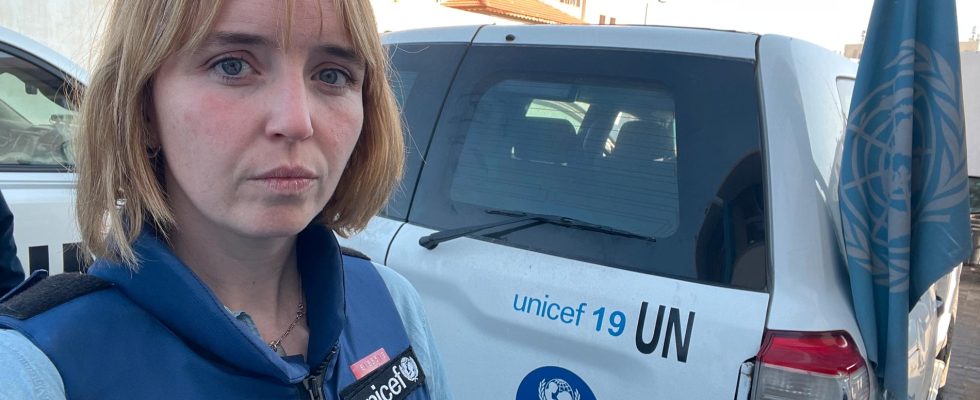unsaveSave
expand-left
full screen Unicef’s Tess Ingram on site in the Gaza Strip. Archive image. Photo: Unicef
While waiting for a ceasefire, the situation in the Gaza Strip is worse than ever.
– Everyone I meet has their own version of loss – of death, destruction, flight, says Tess Ingram from Unicef.
– Especially here in Rafah, people see no end to it.
The hope for preventing famine lies in new water deliveries – and energy biscuits.
The UN agency Unicef spokesperson Tess Ingram is back in the Gaza Strip, while aid and goods are flowing into the Palestinian territory like never before during the six-month war: over 400 trucks a day in recent days.
But it is still not enough by a long shot. And Tess Ingram sees only differences for the worse compared to the last time she was there, in January.
– Here in Rafah it is so clear that the war has raged for three more months. The building is in disrepair. Garbage on the streets. And everybody I talk to, they look exhausted, they’re hungry.
She fumbles for words to describe the dejection.
– Well, they just … it becomes so obvious in their mood how high the price of war is.
Want to return home
To Rafah, the southernmost part of the Gaza Strip, most of the region’s population has fled. And now that Israel has withdrawn all ground forces from that half of the Palestinian area, many had hoped to be able to return to their home areas, including in the big city of Khan Yunis, just a few miles from Rafah. But that hope is fading.
– People are trying to get back to Khan Yunis to see what is left.
But the city is destroyed.
– For many there is nothing left. They have to rebuild everything.
Water in tankers
It is just as bad for vital infrastructure such as the water network. Many desalination plants are destroyed, and this also applies to pipe systems for water distribution. But getting such technical equipment through Israel’s security checks is difficult. So Ingram says aid agencies are now trucking drinking water into tanker trucks.
– We focus on bringing in medical food supplements and clean, safe water. Those are the two things that really make a difference.
Gives a nutritional boost
Then Tess Ingram refers not least to the northern half of the Gaza Strip, which the Israeli military still keeps closed off from the southern parts. So in the north it is even more difficult to distribute aid, while people live on the brink of starvation. Small packages of energy biscuits or nutritious nut cream can save lives.
– It gives a nutritional boost to pregnant women and children, to prevent them from becoming malnourished, says Tess Ingram.
Because real food is not expected to be available for everyone for a long time yet. The 400 daily trucks with deliveries at present can be compared with 500 trucks per day before the war. And then the Gaza Strip was still a fairly functioning society, unlike today’s completely shattered war zone.
